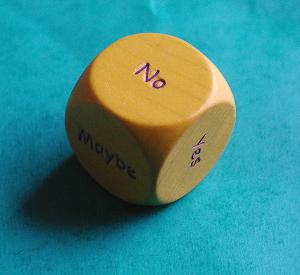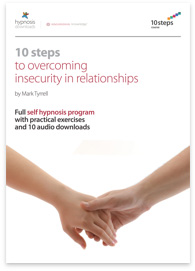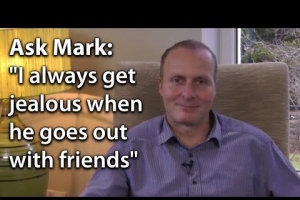Do You Have a Fear of Commitment?
4 tips to help you make up your mind
 "Can you make your mind up?" courtesy of snigl3t
"Can you make your mind up?" courtesy of snigl3t"Competing in sports has taught me that if I'm not willing to give 120 percent, somebody else will." ~ Warren Farrell
'Fear of commitment' is a well-known phrase. We hear it in the media, as well as use it to describe ourselves or other people who seem chronically unable to decide whether to commit properly to a relationship.
Sometimes such people are tagged 'commitment phobes' (1). They fear being 'trapped' and losing, as they see it, their freedom. Fear of commitment might range from a little uncertainty about your relationship to an absolute terror of 'settling down'.
Prefer to watch instead?
Take Nigel, for instance:
"It's not that I don't love her, because I do! But every time she even hints about a long-term future together, I feel cold and sick to my heart. I start wondering how I can escape! I'm just so scared of commitment!"
I have heard variations of this anxiety so often! In this piece, I want to explore exactly what fear of commitment is, why it might have arisen, and, vitally, how to overcome it.
Fear of commitment: What's behind it?
At the heart of all fear is the dread that something might be lost. So someone who has trouble committing may fear losing options. But every decision we make in life, by definition, means losing other options. No matter what you do, there is always another kind of life you could have lived. Commitment phobes fear making the 'wrong decision'.
There's something else. People who fear committing to a relationship will often be scared of committing to other decisions, too. They may have trouble deciding on careers, where to travel on vacation, or even what to eat in a restaurant. So often, a strong relationship pattern will be echoed in other parts of a person's life. So what does someone who seems desperately fearful of commitment really want?
Fearing what we need
The irony is that fear of commitment may mask a desperate desire for the intimacy and security that comes from a healthy long-term relationship. Sometimes we most fear what we most need - in case it doesn't 'work out'.
It may be that, deep down, the person fears being rejected themselves or feels that the consequences of a future relationship breakdown will be all the worse the more time they invest in that relationship.
Maybe they have experienced feeling trapped in a relationship before or perhaps they have a history of painful breakups, of hurting and being hurt. Or they may have witnessed the rocky relationships of parents and have the 'blueprint' that 'no relationship ever works out'.
But any fear will have consequences if prolonged and intense enough - and that's a problem.
The consequences of a fear of commitment
There are dangers involved with not committing, which include the possibility of a lonely life and the throwing away of perfectly good relationships, as the baby gets thrown out with the proverbial bathwater.
Fear of commitment can have devastating emotional consequences, both for the commitment phobe and the people with whom they get involved. Jean, another client, described how her boyfriend of three years just walked out on what seemed to her a perfect relationship:
"It was like he was making up excuses for why the relationship had to end, but none of them rang true to me. I felt there must have been something else going on, something he was afraid of. I could understand it if things had been really rocky, but they hadn't been. I was heartbroken."
But besides running from seemingly good or promising relationships, what other relationship 'symptoms' might the fearer of commitment display?
The hopeless lure of the impossible relationship
It's a myth that people with a chronic fear of settling down always run from relationships. Sometimes I suspect they also pursue 'unattainable people' or get involved with people they know, deep down, are unsuitable for them. The seeds of the convenient end to the relationship are in its very beginning.
These relationship strategies, just as much as running from good relationships, may be a way of avoiding lasting commitment.
So, do you think you have a fear of relationship commitment? Remember, it's important to know that doubts now and then are natural and we can all wonder whether we are doing the right thing sometimes. A real fear of commitment tends to become obvious when we take a long, hard look at our relationship history.
What can you do about it if you really are frightened to settle?
1) Name your fear
Ask yourself: what exactly are you frightened of? We can get so accustomed to using words that we stop seeing the reality behind them, so what does 'commitment' actually mean? And what exactly do you fear losing?
Focus on the fear and see where it leads in your mind. Does it lead to an image of losing the relationship itself at some future time or a single lifestyle or being unable to do what you want when you want? Really get to grips with exactly what it is that frightens you, because 'commitment' is just a word.
Think about what it is exactly that you would be 'giving up'. 'Freedom', 'independence'? What exactly do these words mean to you? No relationship or marriage should take away all freedoms or independence. In fact, a healthy relationship should help you meet your needs for freedom and independence as part of the relationship itself.
Maybe you are used to relationships that are very controlling of your life and time; but these are never healthy relationships if they are based on control of you or by you. A healthy, loving, and respectful relationship should, in essence, be easy to commit to, just as a sturdy sea-worthy boat should be easy to board - easier than, say, a threadbare raft made from rotten wood.
What do you value so highly that you fear surrendering? And ask yourself: Do I want to be 'playing the field' or totally self-referential when I'm 30, 40, 50, and so on? If these ideas have been holding you back...
2) Decide to be more decisive
Indecisiveness becomes a habit over time. Whenever we make a decision about anything, we are committing to it - at least for the time being. If commitment to any decision has been a problem for you, then start practicing being more decisive in lots of small ways.
Sometimes the more time we spend weighing up pros and cons, the more confused we get. And research has even found that over-thinking a decision can lead to poorer choices (2). So get used to just deciding where to eat, what to do, and how to spend your time, and you'll find decisiveness becomes a habit, too.
3) Imagine the fear of commitment has gone
We can get so bound up in what is wrong, we stop looking at how things could be right...in the future. There are many benefits, both physical and mental, to being in a healthy relationship, but you may have only been focussing on your fear of commitment.
Really imagine and perhaps write down in detail your future life without the fear. If the fear just wasn't there to anything like the same degree, what would you do? How will other people know you're braver in this way? What choices will you make free from such a fear? Really explore this.
4) Never say forever because now is all we have
Fear of commitment is so often just a dread of cutting off other options - and thereby feeling trapped. But the funny thing is that, of course, now is all we ever have. Sure, decisions in the present affect the future, but we never really have to say 'forever' about anything, because we don't actually know what will happen in the future.
When I treat a smoker to help them quit, I like to take pressure off by reminding them that they don't need to "be sure they'll never smoke again". Why? Because that's too much pressure. All they need know is that right now it's not what they do. I don't need to say to myself: "I will definitely never smoke!" I doubt I will, but I don't need to think about not smoking far out into the future - right now, it's not what I do.
It's the same with anything. We never have to say 'forever' because life is a series of present moments. Really think about this; maybe what works now won't work in ten years, but maybe it will. The fact is, all of life is an exploration and wanting absolute certainty all of the time about everything is for narrow thinkers.
Trying not to make mistakes may be the biggest mistake of all, and here I'm reminded of the words of the Joni Mitchell song:
"Don't it always seem to go that you don't know what you've got 'til it's gone..."
10 Steps to Overcome Insecurity in Relationships course
Despite how much you love your partner, are you worried you're driving them away?...
References
- The term 'commitmentphobia' was coined in the popular 1987 self-help book Men Who Can't Love by Steven A. Carter and Julia Sokol. (The same authors later wrote a less 'sexist' book about fear of relationship commitment, He's Scared, She's Scared, in 1995.)
- Nordgren, Loran F., Dijksterhuis, A.P. 2009. "The devil is in the deliberation: Thinking too much reduces preference consistency." Journal of Consumer Research 36:39–46.






